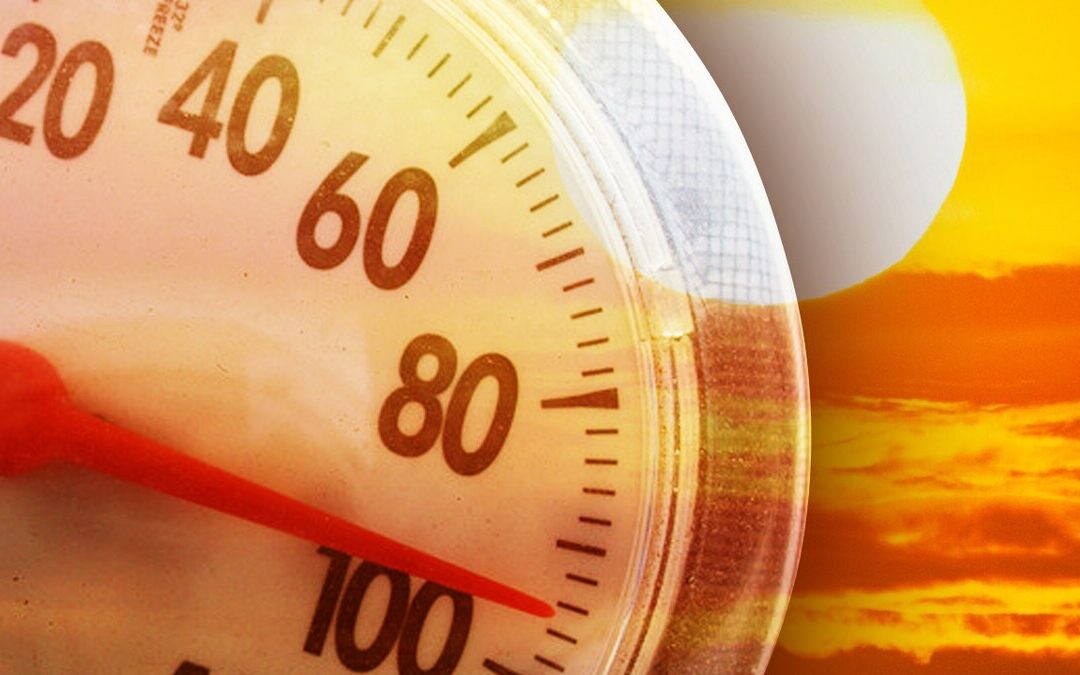High Humidity and heat can have various effects on lawns in New Jersey. The combination of these two factors during the summer months can create challenging conditions for maintaining a healthy and vibrant lawn. In this blog post, we will talk about the effects of high humidity and heat on lawns in New Jersey and explore practical strategies to ensure your lawn remains healthy and vibrant throughout the summer season.
Heat Stress
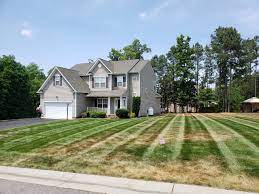 During the sweltering summer months, lawns can suffer from heat stress, causing visible damage such as wilting, browning, and even dormancy. High temperatures can slow down the grass’s ability to absorb water and cool itself through transpiration. High heat can also lead to cellular damage in the grass, making it more susceptible to diseases and pests. To alleviate heat stress consider adjusting your watering schedule. Watering the lawn deeply and infrequently during the early morning or late evening can help cool the turf and encourage deeper root growth and water conservation. Over watering needs to be avoided since this can contribute to other problems like fungal disease. Additionally, raising the mowing height and providing adequate shade, such as from trees or structures can help mitigate the impact of high temperatures.
During the sweltering summer months, lawns can suffer from heat stress, causing visible damage such as wilting, browning, and even dormancy. High temperatures can slow down the grass’s ability to absorb water and cool itself through transpiration. High heat can also lead to cellular damage in the grass, making it more susceptible to diseases and pests. To alleviate heat stress consider adjusting your watering schedule. Watering the lawn deeply and infrequently during the early morning or late evening can help cool the turf and encourage deeper root growth and water conservation. Over watering needs to be avoided since this can contribute to other problems like fungal disease. Additionally, raising the mowing height and providing adequate shade, such as from trees or structures can help mitigate the impact of high temperatures.
Fungal Diseases
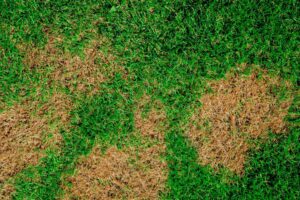 Warm and humid conditions create an ideal environment for fungal pathogens to thrive and attack the grass. Common lawn diseases, such as dollar spot, brown patch, and pythium blight can spread rapidly and cause significant damage to the lawn. Shield your lawn from these threats by practicing good lawn hygiene. Promote good air circulation by pruning back nearby shrubs and ensuring proper drainage so water does not accumulate in one area. Additionally the application of a fungicide treatment to help stop the spread of fungus. For more in depth description of fungal diseases, see our page on disease control Lawn Disease Control – Green Side Up (greensideupsod.com)
Warm and humid conditions create an ideal environment for fungal pathogens to thrive and attack the grass. Common lawn diseases, such as dollar spot, brown patch, and pythium blight can spread rapidly and cause significant damage to the lawn. Shield your lawn from these threats by practicing good lawn hygiene. Promote good air circulation by pruning back nearby shrubs and ensuring proper drainage so water does not accumulate in one area. Additionally the application of a fungicide treatment to help stop the spread of fungus. For more in depth description of fungal diseases, see our page on disease control Lawn Disease Control – Green Side Up (greensideupsod.com)
Weed Growth
 Weeds are opportunistic plants that tend to thrive in conditions where the grass is stressed or weakened. High humidity and heat can cause turf stress, providing an opportunity for weeds to take over. Maintaining a healthy, well fertilized lawn with proper water and mowing practices can help prevent weed infestations. Spot treatment with herbicides can also be used to control weeds without harming the grass. Aeration and seeding in the Fall can help thicken the grass, which leaves less room for weeds to grow the following summer.
Weeds are opportunistic plants that tend to thrive in conditions where the grass is stressed or weakened. High humidity and heat can cause turf stress, providing an opportunity for weeds to take over. Maintaining a healthy, well fertilized lawn with proper water and mowing practices can help prevent weed infestations. Spot treatment with herbicides can also be used to control weeds without harming the grass. Aeration and seeding in the Fall can help thicken the grass, which leaves less room for weeds to grow the following summer.
Insect Pests
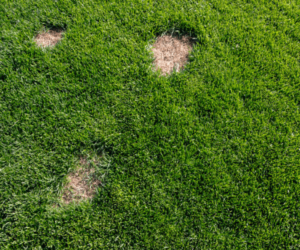 Warm and humid weather can attract a variety of lawn pests, including chinch bugs, grubs, and sod webworms. These pests can feed on the grass causing root damage, thinning and brown patches. Regularly inspecting the lawn for signs of pest activity and applying insecticides when necessary can help control pest populations. Lastly, clean up your yard as much as possible by removing items insects and bugs can hide under like toy slides, flower pots or other lawn ornaments.
Warm and humid weather can attract a variety of lawn pests, including chinch bugs, grubs, and sod webworms. These pests can feed on the grass causing root damage, thinning and brown patches. Regularly inspecting the lawn for signs of pest activity and applying insecticides when necessary can help control pest populations. Lastly, clean up your yard as much as possible by removing items insects and bugs can hide under like toy slides, flower pots or other lawn ornaments.
Nutrient Loss and Root Health
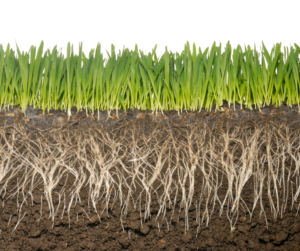 High temperatures and humidity can accelerate microbial activity in the soil, leading to increased decomposition of organic matter. This can result in nutrient leaching and loss, depriving the grass of essential nutrients. Fertilizing the lawn with slow-release fertilizers can provide a steady supply of nutrients to the grass, reducing the risk of nutrient deficiencies. Roots are the foundation of a robust and resilient lawn. The high humidity and heat can result in compacted soil, and poor drainage, restricting oxygen availability for roots. To enhance root health, consider incorporating lawn aeration, which helps loosen compacted soil, improves water and nutrient absorption, and promotes deeper root growth.
High temperatures and humidity can accelerate microbial activity in the soil, leading to increased decomposition of organic matter. This can result in nutrient leaching and loss, depriving the grass of essential nutrients. Fertilizing the lawn with slow-release fertilizers can provide a steady supply of nutrients to the grass, reducing the risk of nutrient deficiencies. Roots are the foundation of a robust and resilient lawn. The high humidity and heat can result in compacted soil, and poor drainage, restricting oxygen availability for roots. To enhance root health, consider incorporating lawn aeration, which helps loosen compacted soil, improves water and nutrient absorption, and promotes deeper root growth.
With all of the perils that can happen with high humidity and heat, call GSU Lawn Fertilization and we can evaluate your lawn and provide a personalized lawn proposal to help you obtain a robust and healthy lawn. We offer fertilization programs, which includes weed control, aeration and seeding, fungal applications, insecticides and more.

